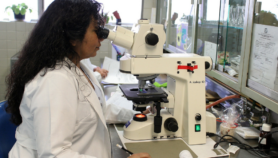By: Linda Nordling
Send to a friend
The details you provide on this page will not be used to send unsolicited email, and will not be sold to a 3rd party. See privacy policy.
Low budgets for research and development (R&D) area perennial grievance for researchers and science policymakers in most developing countries.
In Africa, the shortfall is eye-catching in the private sector. Partly, this is due to a mismatch between higher education and the private sector. Universities have become disengaged from the real-world needs of industry. Engineers and other high-demand skills are scarce.
Although most agree on the solution — reforming curriculums to meet industry's needs and encouraging companies to spend more money on research — it has proved difficult to boost industry's contribution to African research.
In South Africa, a scheme introduced in 2008 whereby companies can claim back tax on their R&D spend has had a disappointing take-up. The rules were reformed last year to make it easier for companies to claim their R&D relief, but the jury is out on whether the fix has worked.
Poor infrastructure such as road networks and power-generating capacity also inhibits industrial development, which in turn limits the role companies can play in research and innovation.
Another challenge for the continent is the murky nature of many private sector operations. A lot of the money — from oil extraction, for instance, or diamond mining — ends up in offshore accounts rather than being invested nationally. This hampers development across the board.
Island innovation
But on the island nation of Mauritius, a ground-breaking plan is being hatched that could help break the impasse between industry and research in the country — and perhaps provide a model for action further afield.
The plan would see part of Mauritian companies' compulsory contribution to poverty reduction and environmental protection earmarked for science, technology and innovation projects.
Mauritius is the only country in the world that forces companies to contribute two per cent of their yearly profits to corporate social responsibility. This money can be spent by the companies on a charitable project of their choice.
However, Dhanjay Jhurry, head of the island's Centre for Biomedical and Biomaterials Research, which is based at the University of Mauritius, is lobbying the government to encourage companies to spend some of this money on what he calls corporate scientific responsibility.
These R&D projects could address issues including education, renewable energy, health research and ocean studies — areas identified by the government as key to the country's sustainability.
"This concept is novel and has not been used anywhere else in the world. Mauritius could champion this idea and demonstrate intellectual creativity," says Jhurry.
The plan is still at a proposal stage.
The country's next budget, due to be presented in November, will tell whether Jhurry's idea has found a footing.
No silver bullet
Mauritius's idea could be extended to other African countries, albeit with slight modifications.
Elsewhere on the continent there aren't state-set levels for corporate social responsibility funding. But voluntary contributions are a popular way for companies — particularly those operating in polluting sectors such as air travel — to put a more positive and caring spin on their corporate image.
Such goodwill gestures should be extended to higher education and research support. For instance, business-funded scholarships for bright students would be a great start.
But while the concept of corporate scientific responsibility could be positive in the African context, it will not be a silver bullet to fix the continent's under-spend in industrial R&D.
The whole point of industry R&D, and the important role it plays in the economic development of a country, is that it implies a level of competitiveness. Healthy R&D spend levels indicate that companies view a country as a place where they can grow and find the right skills — just look at the number of top companies setting up R&D centres in emerging markets in Asia and South America.
One African country that is doing well in attracting businesses into R&D is Kenya. And it has done so because the companies see Kenya as a growth market.
Telecommunications giant IBM last year located its first Africa-based research lab, which is now running, in Nairobi. And last month a Kenyan mobile company, Safaricom, announced it will fund a telecommunications lab at the country's Jomo Kenyatta University of Agriculture and Technology.
In Kenya, a dash of corporate scientific responsibility might add to such growing collaboration between industry and universities.
But in many African countries such as Senegal, Tanzania and Uganda poor infrastructure, difficult business regulations and flimsy public support for higher education still stifle industry investments.
In such countries, corporate scientific responsibility may provide part of a solution for boosting industry-funded R&D — but it won't be the only solution.

Journalist Linda Nordling, based in Cape Town, South Africa, specialises in African science policy, education and development. She was the founding editor of Research Africa and writes for SciDev.Net, Nature and others
This article has been produced by SciDev.Net's Sub-Saharan Africa desk.














